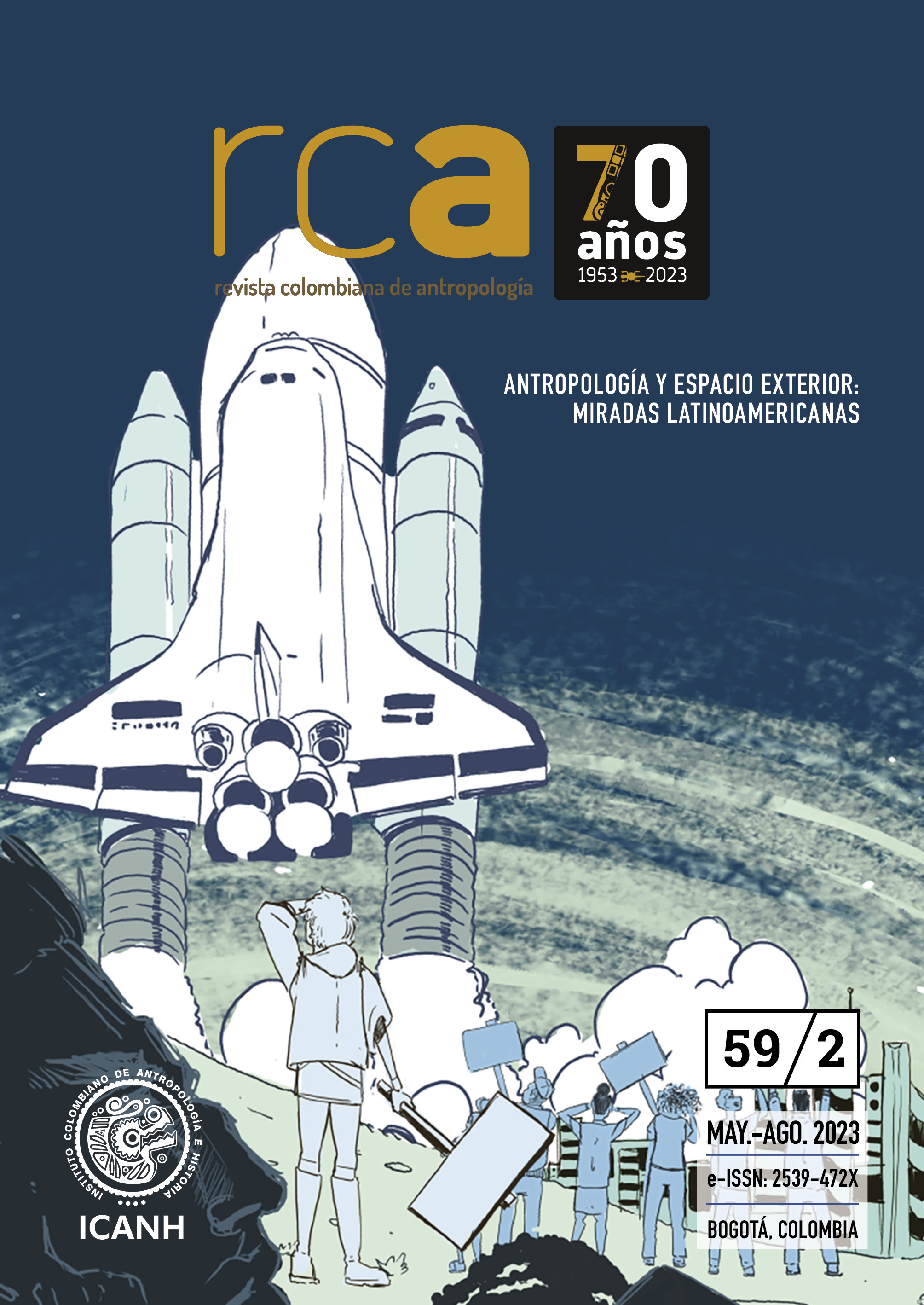Imaginaries of the outer space: The Star Wars Phenomenon as a creation of new possible worlds
DOI:
https://doi.org/10.22380/2539472X.2422Keywords:
mythology, outer space, performance, Star Wars, globalizationAbstract
This article analyzes the phenomenon of Star Wars as a global, deterritorialized, and
fluid culture. It argues that Star Wars is a representative example of an outer space
imaginary that creates its own possible worlds. However, the best way to understand these imaginaries is through the collective practices it produces. Therefore, the text describes the performative, organizational and experiential domains that appear in
the international conventions around Star Wars and in the practices undertaken by
different fan clubs in Mexico.
Downloads
References
Amoras, Noshua. 2021. “Jugar al caboclo en el maracatú de Mata Norte en Pernambuco”. Revista Colombiana de Antropología 57 (2): 69-88. https://doi.org/10.22380/2539472X.2017
Battaglia, Debbora. 2005. E. T. Culture: Anthropology in Outerspaces. Durham y Londres: Duke University Press.
Becker, Edith y Kevin Burns, dirs. 2004. Empire of Dreams: The History of the Star Wars Trilogy. Documental, 150 minutos. https://www.disneyplus.com/movies/imperio-de-suenos-la-historia-de-la-trilogia-destar-wars/zTcS6xwUFnKx
Bell, Catherine. 2009. Ritual Theory, Ritual Practice. Oxford: Oxford University Press.
Bloch, Maurice. 2008. “Why Religion is Nothing Special, but it is Central.” Philosophical Transactions of the Royal Society B: Biological Sciences (363): 2055-2061. https://doi.org/10.1098/rstb.2008.0007
Boyer, Pascal. 2001. Religion Explained: The Evolutionary Origins of Religious Thought. Nueva York: Basic Books.
Brode Douglas y Leah Deyneka, eds. 2012. Sex, Politics and Religion in Star Wars. An Anthology. Lanham, Toronto y Plymouth: The Scarecrow Press.
Cambridge Dictionary. s. f. “Cosplay”. Consultado el 6 de octubre de 2021. https://dictionary.cambridge.org/es/diccionario/ingles/cosplay
Campbell, Joseph. 1959. El héroe de las mil caras: psicoanálisis del mito. México: Fondo de Cultura Económica.
Danowski, Déborah y Eduardo Viveiros de Castro. 2019. ¿Hay mundo por venir? Ensayo sobre los miedos y los fines. Buenos Aires: Caja Negra Editora.
Eberl, Jason y Kevin Decker, eds. 2016. The Ultimate Star Wars and Philosophy: You must Unlearn What You Learned. Oxford: Wiley Blackwell.
Franklin, Mary. 2017. “Behind the Scenes Secrets of Star Wars Celebration”. Consultado el 26 de mayo del 2022. https://www.starwars.com/news/5-behind-the-scenes-secretsof-star-wars-celebration
Geertz, Clifford. 2003. La interpretación de las culturas. Barcelona: Gedisa.
Goffman, Erving. 1997. La presentación de la persona en la vida cotidiana. Buenos Aires: Amorrortu editores.
Goody, Jack. 1961. “Religion and Ritual: The Definitional Problem”. British Journal of Sociology 12: 142-164. https://doi.org/10.2307/586928
Guynes, Sean y Dan Hassler-Forest, eds. 2018. Star Wars and the History of Transmedia Storytelling. Amsterdam: Amsterdam University Press.
Handelman, Don. 1998. Models and Mirrors: Towards an Anthropology of Public Events. Nueva York y Oxford: Berghahn Books.
—. 2006. “Conceptual Alternatives to ‘Ritual’”. En Theorizing Rituals; Issues, Topics, Approaches, Concepts, editado por Jens Kreinath, Jan Snoek y Michael Stausberg, 37-49. Leiden y Boston: Brill Academic Publishers.
Jenkins, Henry. 2006. Convergence Culture: Where Old and New Media Collide. Nueva York: New York University Press.
Kapferer, Bruce. 1997. The Feast of the Sorcerer: Practices of Consciousness and Power. Chicago y Londres: The University of Chicago Press.
Khosravi, Shahram. 2010. ‘Illegal’ Traveller: An Auto-Ethnography of Borders. Nueva York: Palgrave Macmillan.
Lambek, Michael. 2021. Concepts and Persons. The Tanner Lectures on Human Values. Toronto, Buffalo y Londres: University of Toronto Press.
Mauss, Marcel. 2004. The Gift: The Form and Reason for Exchange in Archaic Societies. Foreword by Mary Douglas. Londres: Routledge.
Proctor, William y Richard McCulloch, eds. 2019. Disney’s Star Wars: Forces of Production, Promotion, and Reception. Iowa City: University of Iowa Press.
Rappaport, Roy. 2001. Ritual y religión en la formación de la humanidad. Cambridge: Cambridge University Press.
Salazar, Noel. 2017. “Introduction: Exposing Sports Mega-Events Through a Mobilities Lens”, en Mega-Event Mobilites: A Critical Analysis, editado por Noel Salazar, Christiane Timmerman, Johan Wets, Luana Gama Gato y Sarah Van den Broucke, 1-15. Londres y Nueva York: Routledge.
Saler Benson, Charles Ziegler y Charles Moore. 1997. UFO Crash at Roswell: The Genesis of a Modern Myth. Washington y Londres: Smithsonian Institution Press.
Southwold, Martin. 1978. “Buddhism and the Definition of Religion”. Man 13 (3): 362-379. https://doi.org/10.2307/2801935
Turner, Victor. 1988a. El proceso ritual. Estructura y antiestructura. Madrid: Taurus.
—. 1988b. The Anthropology of Performance. Prefacio de Richard Schechner. Nueva York: PAJ Publications.
Wetmore, Kevin J. 2000. “The Tao of ‘Star Wars’ Or, Cultural Appropriation in a Galaxy Far, Far Away”. Studies in Popular Culture 23 (1): 91-106. https://www.jstor.org/stable/23414569
Downloads
Published
How to Cite
Issue
Section
License

This work is licensed under a Creative Commons Attribution-NonCommercial-NoDerivatives 4.0 International License.




















